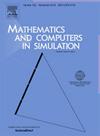Hierarchical Newton iterative identification methods for a class of input multi-piecewise Hammerstein models with autoregressive noise
IF 4.4
2区 数学
Q1 COMPUTER SCIENCE, INTERDISCIPLINARY APPLICATIONS
引用次数: 0
Abstract
Advancements in mathematical theories and applied technologies have driven research on modeling and identification of complex nonlinear systems, yet existing models still face challenges in terms of model structures, accuracy of parameter estimation, and efficiency. In this study, we present a class of input multi-piecewise Hammerstein models that utilize piecewise-linear function to capture arbitrary nonlinear characteristics. By employing the key term separation technique and the Newton iterative algorithm for parameter estimation, a generalized Newton iterative algorithm is proposed, which overcomes the limitations of conventional identification methods in handling complex nonlinearities. Additionally, considering the computational load caused by the numerous parameters in multi-piecewise linear function and the inversion of the Hessian matrix in the Newton iterative algorithm, the hierarchical identification principle is introduced and a three-stage generalized Newton iterative algorithm is derived for enhancing the computational efficiency. The feasibility of the presented methods are demonstrated through a simulation example.
一类具有自回归噪声的输入多分段Hammerstein模型的层次牛顿迭代辨识方法
数学理论和应用技术的进步推动了复杂非线性系统建模和识别的研究,但现有模型在模型结构、参数估计的准确性和效率方面仍然面临挑战。在本研究中,我们提出了一类输入多分段Hammerstein模型,该模型利用分段线性函数捕获任意非线性特征。利用关键项分离技术和牛顿迭代算法进行参数估计,提出了一种广义牛顿迭代算法,克服了传统辨识方法在处理复杂非线性问题时的局限性。此外,考虑到多分段线性函数中参数众多以及Newton迭代算法中Hessian矩阵的反演所带来的计算负荷,引入层次辨识原理,推导出三阶段广义Newton迭代算法以提高计算效率。通过仿真算例验证了所提方法的可行性。
本文章由计算机程序翻译,如有差异,请以英文原文为准。
求助全文
约1分钟内获得全文
求助全文
来源期刊

Mathematics and Computers in Simulation
数学-计算机:跨学科应用
CiteScore
8.90
自引率
4.30%
发文量
335
审稿时长
54 days
期刊介绍:
The aim of the journal is to provide an international forum for the dissemination of up-to-date information in the fields of the mathematics and computers, in particular (but not exclusively) as they apply to the dynamics of systems, their simulation and scientific computation in general. Published material ranges from short, concise research papers to more general tutorial articles.
Mathematics and Computers in Simulation, published monthly, is the official organ of IMACS, the International Association for Mathematics and Computers in Simulation (Formerly AICA). This Association, founded in 1955 and legally incorporated in 1956 is a member of FIACC (the Five International Associations Coordinating Committee), together with IFIP, IFAV, IFORS and IMEKO.
Topics covered by the journal include mathematical tools in:
•The foundations of systems modelling
•Numerical analysis and the development of algorithms for simulation
They also include considerations about computer hardware for simulation and about special software and compilers.
The journal also publishes articles concerned with specific applications of modelling and simulation in science and engineering, with relevant applied mathematics, the general philosophy of systems simulation, and their impact on disciplinary and interdisciplinary research.
The journal includes a Book Review section -- and a "News on IMACS" section that contains a Calendar of future Conferences/Events and other information about the Association.
 求助内容:
求助内容: 应助结果提醒方式:
应助结果提醒方式:


